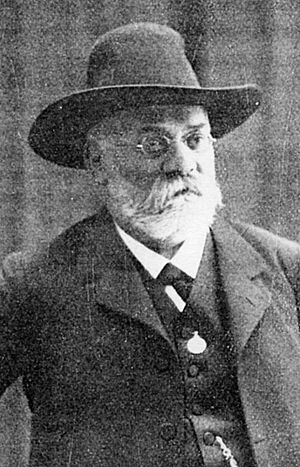Paul Deussen facts for kids
Quick facts for kids
Paul Deussen
|
|
|---|---|

Paul Deussen, circa 1914
|
|
| Born | 7 January 1845 Oberdreis, German Confederation
|
| Died | 6 July 1919 (aged 74) |
| Nationality | German |
Paul Jakob Deussen (born January 7, 1845 – died July 6, 1919) was a German professor who studied philosophy. He was especially interested in India and its ancient languages and ideas. People who study India's history, languages, and cultures are called Indologists. Deussen was a good friend of famous thinkers like Friedrich Nietzsche and Swami Vivekananda. He was also a big fan of another philosopher named Arthur Schopenhauer. In 1911, Deussen even started a group called the Schopenhauer Society to share Schopenhauer's ideas. He also helped start a scholarly magazine called the Schopenhauer Yearbook in 1912.
Deussen admired the ancient Indian language Sanskrit so much that he changed his name to "Deva-Sena" in Sanskrit. He was one of many European scholars who helped the Western world discover the rich culture and wisdom of India, especially through its Sanskrit writings and the Hindu religion.
Biography
Paul Deussen was born on January 7, 1845, in a small town called Oberdreis in Germany. He was one of eight children in his family. From a young age, he became a dedicated follower of the German philosopher Arthur Schopenhauer. He also admired the ideas of another philosopher, Immanuel Kant. Deussen became friends with Friedrich Nietzsche, who was also a very important thinker.
Deussen studied at the Universities of Bonn, Tübingen, and Berlin between 1864 and 1881. He wrote his main paper for his degree about the philosophy of Plato. Later, he became a professor at the University of Kiel, where he taught from 1889 until he passed away in 1919. During this time, he continued to work on editing Schopenhauer's writings and the Schopenhauer Yearbook magazine.
Deussen's interest in Sanskrit and Hinduism began when he attended a lecture at the University of Bonn. Professor Christian Lassen was talking about an ancient Indian play called Shakuntala, and Deussen was fascinated.
Paul Deussen wrote many important books. His first book, published in 1877, was later translated into English as The Elements of Metaphysics in 1894. He also translated important Indian texts like The Sutra of the Vedanta (1906) and The Philosophy of the Upanishads (1906). Another key work was The System of the Vedanta (1912).
In 1904, Deussen visited India, and he wrote about his experiences in a book called My Indian Reminiscences, published in English in 1912. His own life story, written by his daughter Erika, was published in German in 1922.
Deussen's book System of the Vedanta has been printed many times. In this book, he explains the ideas of Vedanta, which is a major school of Hindu philosophy. He used ancient texts like the Brahmasutra and the writings of Adi Shankara to explain these complex ideas.
Experts describe Deussen's work as very thorough and insightful. He is known as an Orientalist and a great scholar of Sanskrit. Paul Deussen is remembered alongside other important European scholars like Sir William Jones and Max Müller. These scholars helped bring the rich knowledge of Hinduism, found in Sanskrit documents, to the attention of the Western world.
Works
Here are some of the books Paul Deussen wrote:
- Die Elemente der Metaphysik (1877)
- Das System des Vedânta (1883)
- Die Sûtra's des Vedânta (1887)
- Allgemeine Geschichte der Philosophie unter besonderer Berücksichtigung der Religionen (a multi-volume work on the general history of philosophy, including:
- Band I, Teil 1: General Introduction and Philosophy of the Veda up to the Upanishad's (1894)
- Band I, Teil 2: The Philosophy of the Upanishad's (1898)
- Band I, Teil 3: The Post-Vedic Philosophy of the Indians (1908)
- Band II, Teil 1: The Philosophy of the Greeks (1911)
- Band II, Teil 2,1: The Philosophy of the Bible (1913)
- Band II, Teil 2,2: The Philosophy of the Middle Ages (1915)
- Band II, Teil 3: Modern Philosophy from Descartes to Schopenhauer (1917))
- Sechzig Upanishad's des Veda (1897)
- Erinnerungen an Friedrich Nietzsche (1901)
- Erinnerungen an Indien (1904)
- Vedânta und Platonismus im Lichte der Kantischen Philosophie (1904)
- Outlines of Indian philosophy, with an appendix: On the philosophy of the Vedânta in its relations to Occidental metaphysics (1907)
- Vedânta, Platon und Kant (1917)
- Mein Leben (1922)
See also
 In Spanish: Paul Deussen para niños
In Spanish: Paul Deussen para niños

